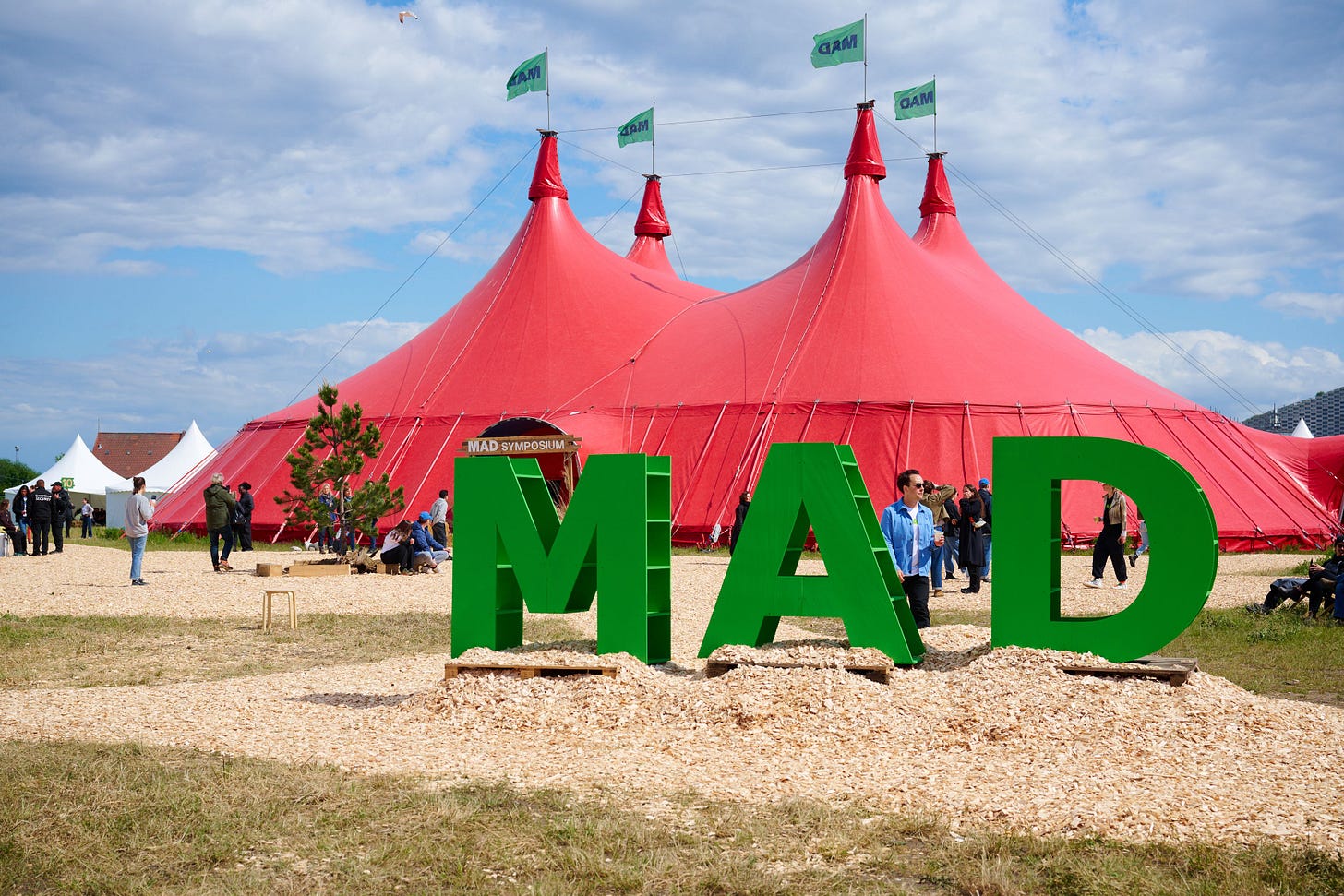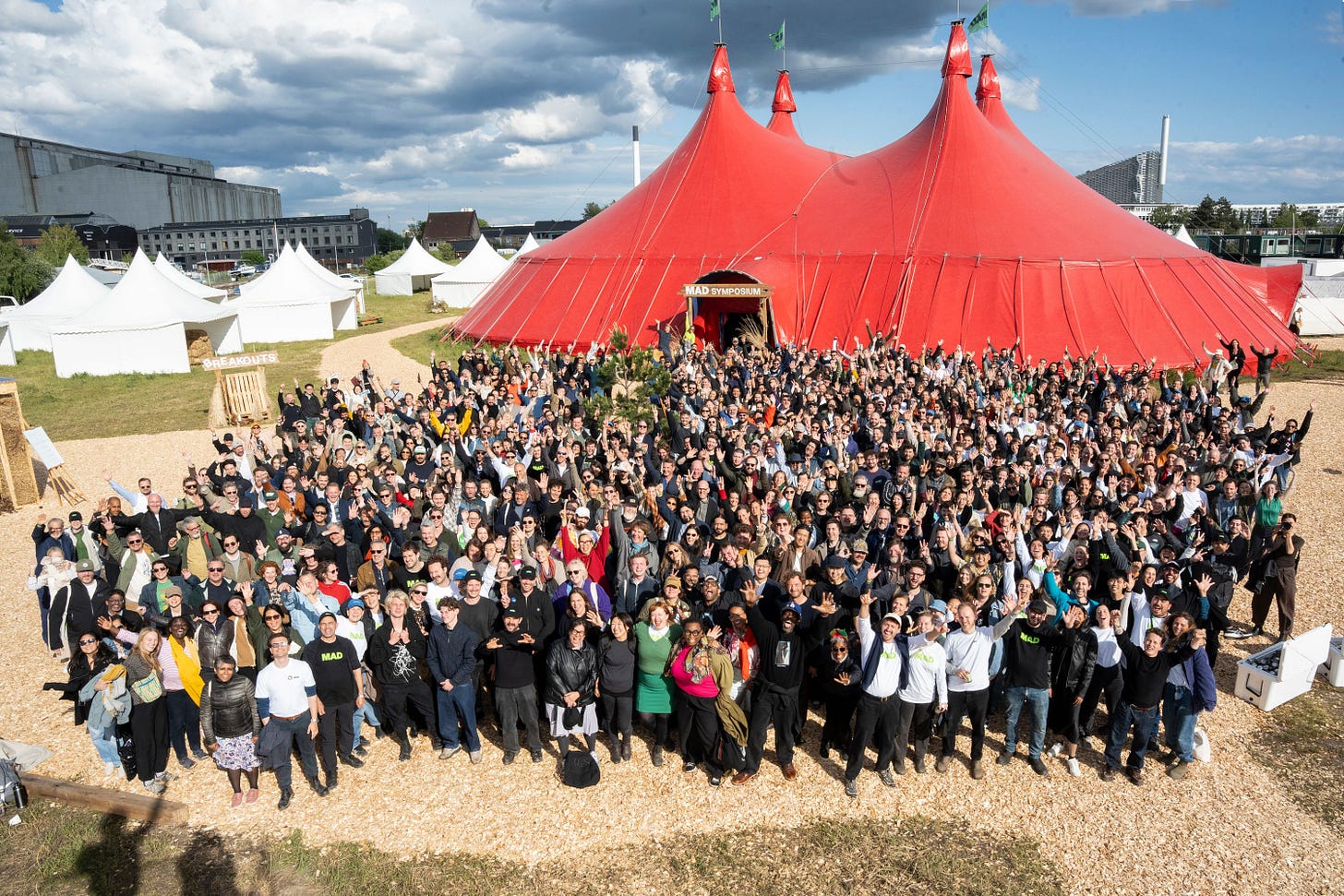People…happy June. Did any of you grill vegetables over the weekend? How did it go?
Today I want to tell you about an inspiring weekend I just spent in Copenhagen for the MAD Symposium, a gathering of people from the industry—cooks, chefs, farmers, fishers, bartenders, writers, and beyond—who spent two days together sharing ideas and amazing meals (like breakfast from the brilliant Mexican chef Rosio Sanchez and the Copenhagen bakery Hart Bageri, or lunch from the very famous St. John restaurant in London and the LA Thai restaurant Anajak, all served at very, very long tables to the 700 people at the symposium!).
MAD was created by René Redzepi, the incredible creator and chef of noma in Copenhagen (only the best restaurant in the world, many times over). The theme of the conference this year was “Build to Last” — how we can make sure that our planet, our communities, our industry, and our people can continue to last, to grow, and to thrive—now, and for years to come.
In 2016, I presented at MAD (yes, I was barefoot on the stage!) about solidarity in the kitchen, how kitchen and restaurant teams work together to build a community.
This year, I was proud to be a supporter of René’s incredible MAD Symposium through my Longer Tables Fund.
René and I were able to spend time in the tent discussing a lot of things—the restaurant industry, World Central Kitchen, my work, his work, where we are all going from here. The interview isn’t online yet, but I’ll be sure to share it when it is. For now, you should listen to this conversation I had with René for his podcast ahead of the conference:
René and I closed out the symposium, but before that, I got to hear from some incredible people from around the world and around the industry. There were four female fishing guides from Iceland, in their teens and early twenties, who gave us the very important message about the effects of farmed Atlantic salmon on the populations of wild salmon in Iceland and beyond. It’s so important to be listening to young people, especially the ones on the cutting edge of climate change and the human effects on our earth, because they are the ones who will be living in the future that we are creating today. A new documentary will be coming out about them shortly…keep your eyes open for Strengur.
Pablo Usobiaga, of Baldió restaurant in Mexico City, told the group all about the ancient chinampas, an area of islands and canals that were built during the Aztec Empire as a super high-yielding agricultural system. Many of the chinampas have fallen out of use, but Pablo and others have been working to refurbish them, to bring them back to life. Pablo asked the group if the Aztecs were able to sustain a system like that 4,000 years ago, what are we doing to create agricultural systems that can survive for the next 4,000 years?
Ángel León, of restaurant Aponiente in the south of Spain near where I spend my summers, spoke about how to be more deeply connected with the sea, and how to take from it without taking too much. He’s been working on a fascinating project about sea rice, a grain that grows in a seagrass called eelgrass that’s high in protein, stores carbon, and can be made to be delicious. It’s people like Ángel who are thinking on an entirely different plane than so many people, thinking not just about how to make incredible food, but to be paving the way to a future that is sustainable and delicious.
Matty Matheson and Courtney Storer—who both worked on the TV show The Bear (have you all seen it??), talked about the production of the show, which had so many issues of mental health and the idea that restaurants provide families for people who don’t always have that at home…I loved listening to them.
We heard from many amazing people over the two days: Chido Govera, a nonprofit community leader and mushroom farmer from Zimbabwe, talked about how she has used farming to bring hope to young girls around her country…the British chef Asma Khan talked about giving people second chances, and about how she has surrounded herself with incredible women…Justin Pichetrungsi, the chef at one of my favorite restaurants anyway, Anajak in LA, talked about the legacy of continuing his parents’ restaurant.
I was also able to spend time with some grantees and partners of of my Longer Tables Fund, like Kamal Mouzawak, who I told you about a few weeks ago. Yuliya Stefanyuk and Andriy Dykun from Ukraine were there—Yuliya works with WCK and Andriy with the SaveUA Foundation. A few members of World Central Kitchen’s Chef Corps came: Aline Kamakian from Beirut, Belinda Bishop from Grenada, and Laura Hayes, who runs the Chef Corps. Dr. Kira O’Brien from Emma’s Torch, the amazing refugee-training organization, came. And of course, I had to bring Dr. Tara Scully, who runs the Global Food Institute at the George Washington University!
To be surrounded by such brilliance and thoughtfulness was inspiring for me, and I hope for a lot of people in the industry (and I hope maybe you too!). We need to be thinking not just about this quarter, or this year, or even this decade—but how to build ourselves, and our communities, to last.









Jose, I cut up zucchini, yellow squash, bell peppers, onions, carrot sticks, potatoes slices and drizzled them with olive oil and seasoning. Also made a nice New York steak to go with them of course medium rare. Everyone seem to be happy with it there was nothing left
As always thanks for your ideas, your educational input, your travel recommendations. Longer Tables is the best.❤️
Grilled zucchini, bell peppers and sweet and red onions this weekend, and it was phenomenal